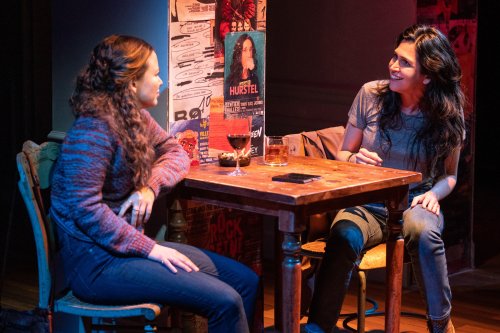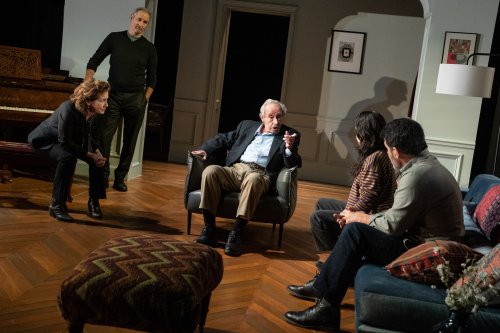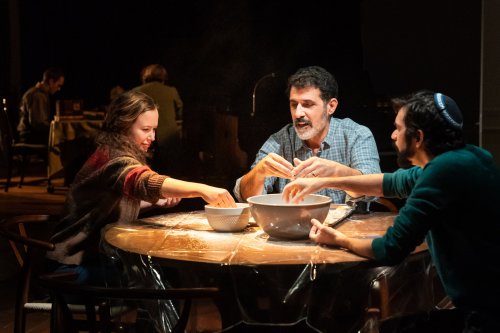Prayer for the French Republic
David Cromer’s production of Joshua Harmon’s ambitious, brilliant and timely play is riveting in its intensity and as a play of ideas it is very accessible to all.

Francis Benhamou, Jeff Seymour, Yair Ben-Dor and Betsy Aidem (back to camera) in a scene from Joshua Harmon’s “Prayer for the French Republic” now at Manhattan Theatre Club’s New York City Center Stage I (Photo credit: Matthew Murphy)
[avatar user=”Victor Gluck” size=”96″ align=”left”] Victor Gluck, Editor-in-Chief[/avatar]
Molly, an entitled New York college student, self-described “Jewish by extraction,” is studying for the year 2016-2017 in France and visits her distant cousin Marcelle in Paris whom she has never met before. It is a year after the Charlie Hebdo shooting so that her Jewish relatives are on edge particularly when Marcelle and Charles’ son Daniel, a math teacher who wears a Yarmulke, is attacked on the street by three men. In a flashback, we see Marcelle and her brother Patrick’s great-grandparents Irma and Adolphe in their Paris apartment in 1944 awaiting news of their sons who they have not heard from throughout the war. Eventually their son Lucien and their 15-year-old grandson Pierre (later Marcelle and Patrick’s father) arrive home from a concentration camp in Poland.
Joshua Harmon’s latest play, the dense, untidy, brilliant and timely Prayer for the French Republic, is his most ambitious, epical play covering five generations of one French Jewish family with relatives in America as they negotiate the troubled landscape in a time when Marine Le Pen, president of the National Front, an anti-Semitic, xenophobic and Islamophobic organization, may win the election for president of France. Marcelle and Charles have to consider if France is still safe for their family which includes 28-year-old daughter Elodie and if not where they should go.

Molly Ranson and Francis Benhamou in a scene from Joshua Harmon’s “Prayer for the French Republic” now at Manhattan Theatre Club’s New York City Center Stage I (Photo credit: Matthew Murphy)
If you think none of this has anything to do with you, Marine Le Pen is currently running for President of France once again and the Manhattan Theatre Club at New York City Center Stage I has a husky guard on watch throughout the performance in Manhattan – that is the world we live in. The play also contains the most dramatic scenes to be played on a New York stage in many years. David Cromer’s production is riveting in its intensity and as a play of ideas it is very accessible even to those who have not been following recent current events.
At slightly over three hours, the time goes very fast due to the ferocity of the performances. However, the play includes too much information and might be a better, more tightly written play if the flashbacks were eliminated. All the story of Irma, Adolphe and Lucien adds to the play is to let us know where the family has come from: having had to escape Strasbourg when the Germans annexed the region in 1870, they were again at risk when the Nazis took over in the 1940’s: son Robert and Lucien’s wife and daughters did not survive the concentration camp. This emphasizes the fact that Charles’ family of Sephardic Jews also had to leave Algeria in 1960 when that became unsafe for them. But the flashback scenes dramatize nothing that could not have been related by their relatives in 2016. And the link between young Pierre and the 80-year-old Pierre (played by necessity by different actors) whom we meet at the end of the third act is so tenuous that we don’t need to meet both incarnations of the man. Young Pierre is so reticent that we actually learn little about him, traumatized as he is by his concentration camp experience.

Betsy Aidem, Richard Topol, Pierre Epstein with Francis Benhamou and Jeff Seymour (backs to camera) in a scene from Joshua Harmon’s “Prayer for the French Republic” now at Manhattan Theatre Club’s New York City Center Stage I (Photo credit: Matthew Murphy)
Another element of the play which could be rethought is the narration by Marcelle’s areligious brother Patrick played by the ironic Richard Topol which seems simply intrusive. It does allow us to hear about atrocities to Jews in France since the Crusades but this could have been revealed by the daughter Elodie who appears to be a student of history. He also reveals that their mother was Catholic so that their Judaism is suspect though Marcelle converted when she married Charles.
Takeshi Kata’s enormous set makes use of a very large revolving stage to segue from Marcelle and Charles’ apartment in 2016 back to the great-grandparents’ apartment in 1944-1946, as well as show us more than one room in the modern set. While the piano (the family business) always remains center stage, the set rotations do not leave the modern apartment that much different than before and often seem gratuitous without giving a cinematic feel to the changes.
The cast is uniformly excellent though the always reliable Betsy Aidem as the controlling psychiatrist Marcelle is often too angry as she tells everyone off – even though she is usually right. Whether this is due to the direction, the script or her own interpretation is not known. As her more laid-back, but troubled husband Charles, Jeff Seymour is an excellent foil for her theatrics. Yair Ben-Dor gives a layered performance as the pragmatic son who has grown used to the anti-Semitism he meets up with in Paris. Francis Benhamou (who shares the same last name as the family in the play) is amusing as the dogmatic talkative daughter Elodie whose profession is never revealed.

Molly Ranson, Jeff Seymour and Yair Ben-Dor (back to camera) in a scene from Joshua Harmon’s “Prayer for the French Republic” now at Manhattan Theatre Club’s New York City Center Stage I (Photo credit: Matthew Murphy)
As Molly, the distant American cousin, Molly Ranson who gave a similar performance as Melody in Harmon’s first play Bad Jews is both passive and retiring as the visiting relative who is willing to listen to others but ultimately comes out of her shell. As the 80-year-old Pierre, father to Marcelle and Patrick and grandfather to Daniel and Elodie, Pierre Epstein almost steals the play when he makes his appearance in the last act to hear about the family’s considered move out of France. He is wry, wise and witty and immediately becomes the center of attention, a fount of good sense and experience.
The 1944-46 family is more problematic as we learn little about them and see them less of the time. However, Nancy Robinette as Irma, Kenneth Tigar as Adolphe, Ari Brand as Lucien and Peyton Lusk as 15-year-old Pierre all give trenchant performances that sum these people up. Sarah Laux’s casual costumes have the spot-on lived-in look of real clothing that immediately define each character. The lighting by Amith Chandrashaker suitably suggests different times of day as well as allowing for the lighting of the Sabbath candles.
Joshua Harmon’s Prayer for the French Republic (whose title refers to a blessing added to the Jewish service over two hundred years ago) is a magnificent achievement. It may not have found its final form as of yet but David Cromer’s production now at Manhattan Theatre Club’s New York City Center Stage I is one of the most exciting pieces of theater to be seen on our stages at this time. Harmon’s best play so far and a towering work, it is a play of emotions and ideas that is engrossing and riveting throughout.
Prayer for the French Republic (extended through March 27, 2022)
Manhattan Theatre Club
New York City Center Stage I, 131 W. 55th Street, in Manhattan
For tickets, call 212-581-1212 or visit http://www.FrenchRepublicPlay.com
Running time: three hours and five minutes with two intermissions






Hi. Enjoyed the play very much! So true!!
I would like to know the name of the piece played on the piano by Pierre while the family was arguing thus trying to calm everyone down
Hello can you let me know the piece Pierre played on the piano in Prayer for The French Republic in the BWay version. It is the piece he plays while during an argument scene.